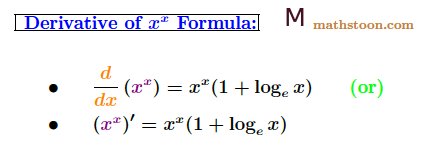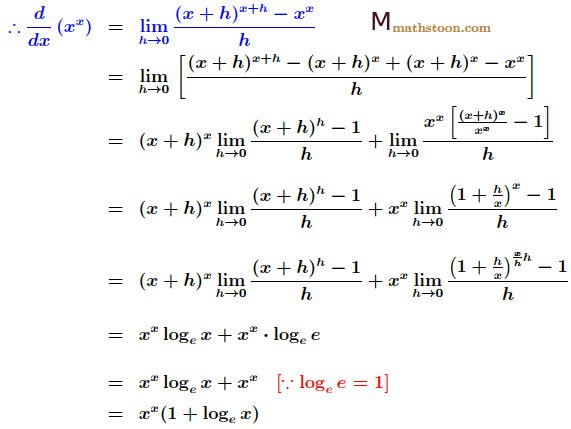The derivative of xx (x to the power x) is equal to xx(1+logex). In this post, we will learn the formula for the derivative of xx and how to find it. To calculate the derivative of x to the x, we will use the following methods:
- Logarithmic differentiation
- First principle of derivatives.
Table of Contents
Derivative of xx Formula
The derivative of xx is denoted by $\dfrac{d}{dx}$(xx) or (xx)$’$. The formula of the derivative of xx is given as follows.
$\dfrac{d}{dx}$(xx) = xx(1+lnx),
where ln denotes the natural logarithm (log with base e), that is, lnx=logex.

Derivative of xx by Logarithmic Differentiation
Note that we use the logarithmic differentiation method to find the derivative of a function having another function as an exponent. Thus, we can find the derivative of x to the power x using this method. Let us put
y=xx
Taking logarithms with base e both sides, we obtain that
loge y = loge xx
⇒ loge y = xloge x by the logarithm rule logabk = k logab.
Differentiating both sides w.r.t. x, we get that
d/dx(loge y) = d/dx(xloge x)
⇒ $\dfrac{1}{y} \dfrac{dy}{dx}$ = x d/dx(loge x) + logex d/dx(x) by the product rule of derivatives.
⇒ $\dfrac{1}{y} \dfrac{dy}{dx}$ = x ⋅ 1/x + logex ⋅ 1
⇒ $\dfrac{dy}{dx}$ = y(1 + logex)
⇒ $\dfrac{dy}{dx}$ = xx(1 + logex) as y=xx.
So the derivative of xx (x to the x) is equal to xx(1 + logex) and this is obtained by the logarithmic differentiation.
Also Read: Derivative of 1/x
Derivative of 1/x2 | Derivative of 1/x3
Derivative of xx by First Principle
The derivative of f(x) by the first principle, that is, by the limit definition is given by
$\dfrac{d}{dx}(f(x))$$=\lim\limits_{h \to 0} \dfrac{f(x+h)-f(x)}{h}$ $\cdots$ (I)
We will use the following fact:
$\lim\limits_{h\to 0}\dfrac{x^h-1}{h}=y$ if and only if $x=\lim\limits_{n\to\infty}\left(1+\dfrac yn\right)^n$ if and only if $x=e^y \iff y=\log(x)$
Put f(x)=xx in the above formula (I). Thus we have:

Thus, the derivative of xx is xx(1+logex) and this is obtained by the first principle of derivatives, that is, by the limit definition of derivatives.
Must Read:
Limit: Definition, Formulas, Examples
Derivative: Definition, Formulas, Examples
Integration: Definition, Formulas, Examples
FAQs on Derivative of xx
Answer: The derivative of xx (x to the x) is xx(1+logex).
Answer: The derivative of 2x is 2xloge2.
This article is written by Dr. T. Mandal, Ph.D in Mathematics. On Mathstoon.com you will find Maths from very basic level to advanced level. Thanks for visiting.